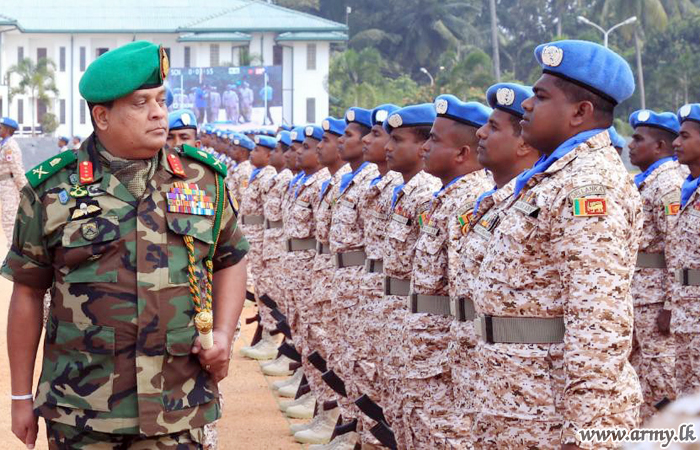
File photograph: Sri Lankan soldiers are inspected by accused war criminal Shavendra Silva, before they leave for a UN mission earlier this year.
United Nations peacekeepers deployed in Haiti, including Sri Lankan soldiers, have fathered hundreds of babies with young mothers - sometimes through sexual violence - before abandoning them, reports a new study published this week.
The study, published today on The Conversation, says that “girls as young as 11 were sexually abused and impregnated by peacekeepers and . . . ‘left in misery’ to raise their children alone”.
That includes Sri Lankan peacekeepers linked to a paedophilic sex ring in Haiti, where at least 134 soldiers exploited nine children from 2004 to 2006. The Sri Lankan military repatriated 114 of the soldiers after a group of children identified them as paedophiles, but none have ever been prosecuted.
Authored by Sabine Lee and Susan Bartels, the study interviewed approximately 2,500 Haitians about their experiences with regards to the UN Stabilisation Mission in Haiti - also referred to as MINUSTAH. Of those, 265 told stories that featured children fathered by UN personnel.
MINUSTAH was employed in the country to assist local Haitian institutions in providing support for the natives following political instability, combatting organised crimes and natural disasters but has now been labelled as one of the most controversial UN missions ever. The mission has been attributed to causing a cholera outbreak which resulted in 10,000 Haitians dying, after it was discovered that Nepalese peacekeepers maintained poor sanitation at a local Haiti base. The UN reluctantly accepted reasonability but have not been suitably compensated victims for the damage it inflicted on the community.
One male community member in Cité Soleil said,
“All day, I heard women who are complaining about the sexual violence that MINUSTAH did to them. And they had given them AIDS through sexual violence. There are also some of them who are pregnant”.
Another in Port Salut said,
“They had sex with the girls not even for money, it’s just for food, for one meal.”
Read more from The Conversation here, the full text of the study here and from The Times here.
The authors of the report have called for UN personnel sent on these missions to learn and understand their power over the vulnerable populations they visit; offenders to face persecution and provide child support in the country they are working; a new rights advocate at the United Nations to be employed to help victims following the shameful history of abuses by peacekeeping forces with improper sanctions for perpetrators and reparations for victims.
Earlier this year the UN declared a ban on all “non-essential” Sri Lankan troops from its peacekeeping missions after accused war criminal Shavendra Silva was appointed to the head of Sri Lanka’s army. However, in a surprise move last month, the global body said hundreds more Sri Lankan soldiers would be joining its mission in Mali, claiming they were “critical” to operations in the country.
We need your support
Sri Lanka is one of the most dangerous places in the world to be a journalist. Tamil journalists are particularly at threat, with at least 41 media workers known to have been killed by the Sri Lankan state or its paramilitaries during and after the armed conflict.
Despite the risks, our team on the ground remain committed to providing detailed and accurate reporting of developments in the Tamil homeland, across the island and around the world, as well as providing expert analysis and insight from the Tamil point of view
We need your support in keeping our journalism going. Support our work today.
For more ways to donate visit https://donate.tamilguardian.com.

